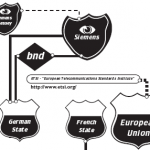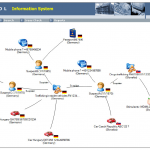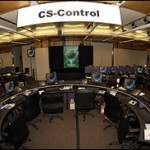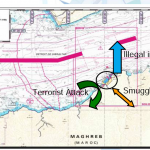Browse: Page 62
By europolice on 10. November 2010
 Eine orbital gestützte Aufklärungskomponente war das Ziel langer Planungen der Bundeswehr auf diesem Gebiet. Satelliten können weiträumig und bei Tag und Nacht innerhalb weniger Stunden riesige Gebiete aufklären. Mit der Einführung des radargestützten Satellitensystems SAR-Lupe (Newsletter Verteidigung berichtete) können seit Dezember 2008 Daten auf der ganzen Welt durch die Bundeswehr erfasst werden. SAR-Lupe gehört zu den leistungsfähigsten Satellitensystemen ihrer Klasse. Die Auflösung der Satelliten liegt bei rund 10cm², was nach Angaben von Aufklärungsspezialisten eine ungeheure Leistung darstellt, die international keinen Vergleich scheuen muss.
Eine orbital gestützte Aufklärungskomponente war das Ziel langer Planungen der Bundeswehr auf diesem Gebiet. Satelliten können weiträumig und bei Tag und Nacht innerhalb weniger Stunden riesige Gebiete aufklären. Mit der Einführung des radargestützten Satellitensystems SAR-Lupe (Newsletter Verteidigung berichtete) können seit Dezember 2008 Daten auf der ganzen Welt durch die Bundeswehr erfasst werden. SAR-Lupe gehört zu den leistungsfähigsten Satellitensystemen ihrer Klasse. Die Auflösung der Satelliten liegt bei rund 10cm², was nach Angaben von Aufklärungsspezialisten eine ungeheure Leistung darstellt, die international keinen Vergleich scheuen muss.
Das System lieferte schon der Bundeswehr sehr gute Aufklärungsdaten aus den Gebieten, wo deutsche Truppen eingesetzt sind. Im Rahmen der europäischen Verteidigungsinitiative arbeiten deutsche und französische Aufklärungsspezialisten schon länger zusammen. Die französischen Streitkräfte setzen auf das Satellitensystem HELIOS, welches mit Infrarotoptischen Sensoren ausgerüstet ist und ebenfalls sehr gute Aufklärungsergebnisse liefert. Deutschland und Frankreich haben jetzt einen Datenaustausch auf militärischer Ebene vereinbart und kombinieren beide Aufklärungssysteme miteinander. Continue reading „Weltraum: Orbitale Aufklärung und Kommunikation verstärkt“
Posted in Militaer, Space |
By europolice on 10. November 2010
 GERMAN ASSOCIATION FOR DEFENCE TECHNOLOGY
GERMAN ASSOCIATION FOR DEFENCE TECHNOLOGY
– Centre for Studies and Conferences –
Solving complex challenges in urban terrain
Reconnaissance – Leadership – Arms – Command & Control
Call for Papers gestartet
Jetzt informieren unter www.dwt-sgw.de
Berlin, Germany, 04 – 06 July 2011 Continue reading „Berlin: International Urban Warfare Conference & Expo“
Posted in Crowd Control, European Police, Militaer, Robotik, Software/ IT |
By europolice on 9. November 2010

(seen at www.kernenergie.de)
Posted in Was tun? |
By europolice on 8. November 2010
 Subject: Joint evaluation of the implementation of the information exchange mechanisms between the GSC/civilian ESDP missions and Europol
Subject: Joint evaluation of the implementation of the information exchange mechanisms between the GSC/civilian ESDP missions and Europol
Europol – General Secretariat of the Council (CPCC)
The aim of this joint evaluation is to report on the progress made in the implementation of the information exchange mechanisms between civilian ESDP police missions and Europol and to make recommendations on the way forward. The report will assess the two types of mechanism currently in place, namely:
– The administrative arrangement agreed between the General Secretariat of the Council (GSC) and the Director of Europol, in force since 25 August 2008, allowing for the exchange of non-personal data2 between Europol and all civilian ESDP police missions, via the GSC3;
– The information exchange mechanism allowing for the exchange of personal data between the EULEX Kosovo Mission and Europol, via the Europol National Units (ENUs) of volunteering Member States. (pdf at register.consilium.europa.eu)
Posted in Datenbanken, English, European Police, Europol, Militaer
By europolice on 8. November 2010
 Ein beträchtlicher Teil aller legislativen politischen Entscheidungen wird mittlerweile über den Umweg der Europäischen Union getroffen. Zu erwartender Widerstand in den 27 Mitgliedsstaaten wird durch dieses “Policy Laundering” ausgebremst, während weiterhin die zahlungskräftigeren Regierungen den Kurs dominieren. Gleichzeitig erweitern sich die Kompetenzen der EU durch eigene Strukturen, die entweder grenzüberschreitende Aktivitäten koordinieren oder Projekte unter eigener Regie vorantreiben. Besonders spürbar ist diese Politik im Bereich europäischer “Homeland Defence” und ihrer Versicherheitlichung, Militarisierung und „Gendarmerisierung“ sozialer Phänomene.
Ein beträchtlicher Teil aller legislativen politischen Entscheidungen wird mittlerweile über den Umweg der Europäischen Union getroffen. Zu erwartender Widerstand in den 27 Mitgliedsstaaten wird durch dieses “Policy Laundering” ausgebremst, während weiterhin die zahlungskräftigeren Regierungen den Kurs dominieren. Gleichzeitig erweitern sich die Kompetenzen der EU durch eigene Strukturen, die entweder grenzüberschreitende Aktivitäten koordinieren oder Projekte unter eigener Regie vorantreiben. Besonders spürbar ist diese Politik im Bereich europäischer “Homeland Defence” und ihrer Versicherheitlichung, Militarisierung und „Gendarmerisierung“ sozialer Phänomene.
Die Entwicklung der EU geht jedoch nicht mit einer gesteigerten Aufmerksamkeit, etwa auf Seiten der Sozialen Bewegungen, einher. Auch die radikale Linke, sonst nie um eine Staatskritik verlegen, bleibt sprachlos.
Eine Erklärung hierfür wäre, dass die EU als politisches Projekt in ihrer Vielfalt und dem ständigen Wandel schwer zu analysieren und zu fassen ist. Der Zusammenhang etwa zwischen Gesetzesänderungen im eigenen Land und einer dafür ursächlichen Richtlinie aus Brüssel ist kaum oder erst spät präsent – zu spät, um dagegen auf die Barrikaden zu gehen. Möglich ebenso, dass dem transnationalen Charakter der EU eine zu wenig über Staatsgrenzen hinaus vernetzte Linke gegenübersteht. Continue reading „Kongress: Die Europäische Union: Analysieren, kritisieren, demontieren“
Posted in Border Control, Datenbanken, Drohnen, Europäischer "Polizeikongress", European Police, Europol, Policing Major Events, Robotik, Software/ IT, Space, Various, Was tun? |
By europolice on 4. November 2010
 DIRECTORATE GENERAL FOR INTERNAL POLICIES
DIRECTORATE GENERAL FOR INTERNAL POLICIES
POLICY DEPARTMENT C: CITIZENS‘ RIGHTS AND CONSTITUTIONAL AFFAIRS
CIVIL LIBERTIES, JUSTICE AND HOME AFFAIRS
STUDY
This study provides an assessment of the EU “public-private dialogue” in security research and of the projects currently funded under the 7th Research Framework Programme (FP7), from the point of view of their contribution to the development of an area of freedom, security and justice. In this study, we ask two simple questions, deriving from the general objectives defined by the Stockholm programme. To what extent is EU-funded security research placed at the service of citizens? To what extent does it contribute to the strengthening of a single area of fundamental rights and freedoms? (pdf at euro-police.noblogs.org)
Posted in Datenbanken, Drohnen, English, European Police, Forschung, Robotik, Software/ IT, Space |
By europolice on 4. November 2010
 Eine US-Botschaft heuert Agenten an. Diese observieren „verdächtige“ Personen, die sich in der Nähe amerikanischer Einrichtungen aufhalten und bauen eine Datenbank auf. Das ist kein Plot für einen Thriller – in Norwegen ist es wirklich passiert.
Eine US-Botschaft heuert Agenten an. Diese observieren „verdächtige“ Personen, die sich in der Nähe amerikanischer Einrichtungen aufhalten und bauen eine Datenbank auf. Das ist kein Plot für einen Thriller – in Norwegen ist es wirklich passiert.
Ein Geheimdienstskandal belastet das Verhältnis zwischen Norwegen und den USA: Die US-Botschaft in Oslo soll im Geheimen eine Überwachungsorganisation aufgebaut haben, die in einer „eigenen Sphäre außerhalb der norwegischen Gesetze“ operiert. (weiter auf fr-online.de)
Posted in Secret Service |
By europolice on 4. November 2010
 Als Reaktion auf den Amoklauf eines Insiders in Fort Hood und die Veröffentlichung geheimer Dokumente durch Wikileaks soll nun mit einer neuen Überwachungstechnik präventiv reagiert werden
Als Reaktion auf den Amoklauf eines Insiders in Fort Hood und die Veröffentlichung geheimer Dokumente durch Wikileaks soll nun mit einer neuen Überwachungstechnik präventiv reagiert werden
Was die frühere Bush-Regierung landes- oder auch weltweit sich gewünscht hat, will nun das Pentagon wenigstens für das US-Militär realisieren, nämlich die gesamte Kommunikation überwachen und durchsuchen, ob sich dort Zeichen für ein verdächtiges Verhalten finden lassen. Hintergrund ist, so gibt zumindest die Darpa, die Forschungsbehörde des Pnetagon, an, der Vorfall auf dem Militärstützpunkt Fort Hood, wo 2009 der islamische Armeepsychiater Nidal Malik Hasan in einem Amoklauf 13 Soldaten tötete und mehr als zwei Dutzend verletzte. Das Pentagon wünscht, aus der Durchsuchung der Kommunikation solchen Gefährdungen zuvorzukommen. (weiter auf heise.de)
Posted in English, Militaer, Software/ IT |
By europolice on 4. November 2010
 Fourteen employees of the Royal Military Police (RMP) and two employees of the Rotterdam Seaport Police are participating in border control units for the Frontex Rapid Border Intervention Teams in Alexandroupolis and Orestiada / Greece starting on November 2, 2010. These 16 will be replaced by December 1, 2010 by other Dutch rabits.
Fourteen employees of the Royal Military Police (RMP) and two employees of the Rotterdam Seaport Police are participating in border control units for the Frontex Rapid Border Intervention Teams in Alexandroupolis and Orestiada / Greece starting on November 2, 2010. These 16 will be replaced by December 1, 2010 by other Dutch rabits.
Operation Poseidon
Dutch bordergards of the RMP were already active this year in border controls at the Greek islands from September 1 to October 20, 2010 within the frame of Frontex Poseidon 2010 (following dutch contribution in Poseidon 2008 and 2009). The Special Security Missions Brigade of the RMP included a rigid-hulled inflatable boat (RHIB) for border control in
the Greek island of Samos. In addition, and together with the Rotterdam Seaport Police, expertise was provided for checking documents and interviewing illegal aliens. Continue reading „Dutch RABITS contribution“
Posted in Border Control, English
By europolice on 4. November 2010
 ANDREW RETTMAN
ANDREW RETTMAN
The OECD, the Paris-based club of the world’s 33 richest countries, has been successfully hacked by people looking for sensitive information on money laundering, high-level corruption and tax evasion.
OECD spokesman Stephen Di Biasio told EUobserver by phone from France on Thursday (4 November) that the body first detected „unusual“ activity in its IT network in August and is still battling to get malware out of its computers three months later despite calling in help from the French security services and private cyber-defence companies. (more on euobserver.com)
Posted in English, Militaer, Software/ IT, Was tun?
By europolice on 4. November 2010
 Spencer Ackerman
Spencer Ackerman
Fifteen thousand military computer networks became protected on November 3, 2010. Those ensconced within of the informational phalanx called the event Cyber Command Day. They lived only to face a new challenge — the war against the Machines.
In truth, yesterday wasn’t quite so dramatic. The Department of Defense announced that the military’s new command for protecting its networks against cyberassault had achieved “full operational capability,” meaning the new U.S. Cyber Command, which opened for business in May, is 100 percent ready for duty, just a month behind schedule. Not that “full operational capability” fills in many of the blanks about when it’s acceptable for Cyber Command to attack a foreign network or how deeply it’ll be involved in the civilian internet. (more on wired.com)
Posted in English, Militaer, Software/ IT |
By europolice on 3. November 2010
 Nach dem Fund einer Paketbombe im Berliner Kanzleramt untersucht das Bundeskriminalamt mögliche Zusammenhänge mit der Anschlagserie in Griechenland. BKA-Chef Jörg Ziercke sagte, dass Ermittler auf dem Weg nach Athen seien. Das BKA wolle erfahren, was die Vernehmungen der festgenommenen Verdächtigen ergeben. Zudem wollten sich die Experten die in Griechenland verwendeten Paketbomben anschauen.
Nach dem Fund einer Paketbombe im Berliner Kanzleramt untersucht das Bundeskriminalamt mögliche Zusammenhänge mit der Anschlagserie in Griechenland. BKA-Chef Jörg Ziercke sagte, dass Ermittler auf dem Weg nach Athen seien. Das BKA wolle erfahren, was die Vernehmungen der festgenommenen Verdächtigen ergeben. Zudem wollten sich die Experten die in Griechenland verwendeten Paketbomben anschauen.
Die griechische Regierung hat wegen der Paktetbomben-Serie für 48 Stunden sämtliche Fracht- und Postflüge ins Ausland gestoppt. Wie die Polizei in Athen mitteilte, soll der vorübergehende Stopp weitere Untersuchungen ermöglichen. Nach Funden in Berlin und Athen war in der Nacht zu Mittwoch auch im italienischen Bologna eine Paketbombe entdeckt worden, adressiert an Ministerpräsident Silvio Berlusconi. (weiter auf mdr.de)
Posted in BKA, European Police |
By europolice on 3. November 2010
 Naval patrols off Somalia’s coast have increasingly disrupted the activities of pirates, with many sea bandits arrested and prosecuted, but others have continued to seize ships using increasingly violent methods, Secretary-General Ban Ki-moon says in a new report.
Naval patrols off Somalia’s coast have increasingly disrupted the activities of pirates, with many sea bandits arrested and prosecuted, but others have continued to seize ships using increasingly violent methods, Secretary-General Ban Ki-moon says in a new report.
He stresses, however, that much more needs to be done, including improvements in the collection of evidence and other investigative activities following arrests at sea, as well as finding long-term legal solutions to the scourge.
UN Member States, the International Criminal Police Organization (INTERPOL) and the European Police Office (Europol) are working together to expose international criminal networks that profit from acts of piracy off the Somali coast, Mr. Ban writes. (more on article.wn.com)
Posted in English, Europol |
By europolice on 3. November 2010
 In den kommenden Wochen werden Polizeivollzugsbeamte der Bundespolizei ihre griechischen Kollegen an der griechisch-türkischen Landgrenze bei der Bewältigung des wachsenden Flüchtlingsstroms unterstützen. Zeitweise werden bis zu 40 deutsche Beamtinnen und Beamte an dem FRONTEX-Einsatz teilnehmen. Die Bundesregierung stellt darüber hinaus sieben Dienstfahrzeuge sowie vier Wärmebildfahrzeuge der Bundespolizei bereit. Der Schwerpunkt des Einsatzes wird in der Gegend um die Stadt Orestiada liegen.
In den kommenden Wochen werden Polizeivollzugsbeamte der Bundespolizei ihre griechischen Kollegen an der griechisch-türkischen Landgrenze bei der Bewältigung des wachsenden Flüchtlingsstroms unterstützen. Zeitweise werden bis zu 40 deutsche Beamtinnen und Beamte an dem FRONTEX-Einsatz teilnehmen. Die Bundesregierung stellt darüber hinaus sieben Dienstfahrzeuge sowie vier Wärmebildfahrzeuge der Bundespolizei bereit. Der Schwerpunkt des Einsatzes wird in der Gegend um die Stadt Orestiada liegen.
Griechenland hatte vor einigen Tagen die Einsatzkräfte und die technischen Mittel bei der Europäischen Grenzschutzagentur FRONTEX angefordert, um angemessen auf den erheblichen Zustrom illegaler Migration reagieren zu können. Insgesamt werden Griechenland über FRONTEX 175 Grenzschutzspezialisten aus den EU-Mitgliedsstaaten zur Verfügung gestellt.
Die Beamtinnen und Beamten der Bundespolizei kommen aus dem gesamten Bundesgebiet und sind für diese Aufgabe speziell aus- und fortgebildet. Continue reading „Bundespolizisten unterstützen im Rahmen des FRONTEX-Einsatzes griechische Behörden“
Posted in Border Control, European Police |
By europolice on 3. November 2010
 The European Commission unveiled two new measures to ensure that Europe can defend itself from attacks against its key information (IT) systems. A proposal for a Directive to deal with new cyber crimes, such as large-scale cyber attacks, is complemented by a proposal for a Regulation to strengthen and modernise the European Network and Information Security Agency (ENISA). The two initiatives are foreseen by the Digital Agenda for Europe and the Stockholm Programme to boost trust and network security (see IP/10/581, MEMO/10/199 and MEMO/10/200). Under the proposed Directive, the perpetrators of cyber attacks and the producers of related and malicious software could be prosecuted, and would face heavier criminal sanctions. Continue reading „European Commission to boost Europe’s defences against cyber-attacks“
The European Commission unveiled two new measures to ensure that Europe can defend itself from attacks against its key information (IT) systems. A proposal for a Directive to deal with new cyber crimes, such as large-scale cyber attacks, is complemented by a proposal for a Regulation to strengthen and modernise the European Network and Information Security Agency (ENISA). The two initiatives are foreseen by the Digital Agenda for Europe and the Stockholm Programme to boost trust and network security (see IP/10/581, MEMO/10/199 and MEMO/10/200). Under the proposed Directive, the perpetrators of cyber attacks and the producers of related and malicious software could be prosecuted, and would face heavier criminal sanctions. Continue reading „European Commission to boost Europe’s defences against cyber-attacks“
Posted in English, European Police, Militaer, Software/ IT |
By europolice on 2. November 2010
 The idea behind
The idea behind
The basic idea of Rapid Border Intervention Teams was to create such a mechanism that could allow, in case of urgent and exceptional migratory pressure, rapid deployment of border guards on a European level.
Rapid Border Intervention Teams are intended to provide short‐term assistance. The responsibility for the control and surveillance of the external borders remains to lie with the Member States. (pdf at statewatch.org)
Posted in Border Control, English, European Police |
By europolice on 2. November 2010
 FoRE launched our latest briefing on the rapid rise of armed drones in conflict at the Drone Wars conference in London on 18th September, and it is now available to the public.
FoRE launched our latest briefing on the rapid rise of armed drones in conflict at the Drone Wars conference in London on 18th September, and it is now available to the public.
The detailed briefing, „Convenient Killing: Armed Drones and the ‚Playstation Mentality'“, provides an overview of the rise of Unmanned Arial Vehicles (UAVs), commonly known as drones, in armed conflict. It raises a number of serious concerns about the introduction of armed drones into modern warfare, including high levels of civilian casualties, the use of drones in targeted killings and the idea of a ‚Playstation Mentality‘ whereby the geographical and psychological distance between the drone operator and target lowers the threshold for launching an attack. Continue reading „Convenient Killing: Armed Drones and the ‚Playstation Mentality‘“
Posted in Drohnen, English, Forschung, Militaer |
By europolice on 2. November 2010
 Rob Nicholson, the Minister of Justice and Attorney General of Canada, the other day re-introduced in the House of Commons two bills that would provide law enforcement and national security agencies with up-to-date tools to fight crimes such as gang- and terrorism-related offences and child sexual exploitation.
Rob Nicholson, the Minister of Justice and Attorney General of Canada, the other day re-introduced in the House of Commons two bills that would provide law enforcement and national security agencies with up-to-date tools to fight crimes such as gang- and terrorism-related offences and child sexual exploitation.
“New and evolving technologies provide new ways of committing crimes, making them harder to investigate,” said Nicholson. “We must ensure that law enforcement has the means to bring to justice those who would break the law. Twenty-first-century technology demands twenty-first-century tools for police to effectively investigate crime.” (more on homelandsecuritynewswire.com)
Posted in English, European Police, Software/ IT
By europolice on 2. November 2010
 Motoring organisations give promised system a cautious welcome – as long as it is not used just to raise money
Motoring organisations give promised system a cautious welcome – as long as it is not used just to raise money
Steven Morris
A speed camera designed to catch motorists committing up to five offences at the same time could be heading to Britain’s roads. As well as catching speeding motorists, the Asset camera should be able to pick out drivers who are not wearing seatbelts and accurately measure distances between moving cars to identify tailgating.
Asset (advanced safety and driver support for essential road transport) can also note number plates and recognise cars with out-of-date tax discs and no insurance. (more on guardian.co.uk)
Posted in English, European Police, Forschung |
By europolice on 2. November 2010
 By Apostolis Fotiadis
By Apostolis Fotiadis
The notice appeared quietly on the website of Frontex, Europe’s agency to fight undocumented migration. It called for expressions of interest in demonstrating „Small UAVs (Unmanned Aerial Vehicles) and Fixed systems for Land border surveillance“ at its workshop.
„In the domain of land border surveillance, there is a wide spectrum of possible technical means that can be employed to provide effective surveillance including: daylight and infrared cameras, ground radars, fixed ground sensors, mobile systems, manned aircraft and satellites,“ the notice read.
„However, it is clear that Unmanned Aerial Vehicles (UAVs) could also play an important role in further enhancing border surveillance in the future, though they face a number of technical and other challenges.“
Cautious as this sounds, Frontex has been particularly interested in introducing UAVs, or Drones as they are more popularly known, for European border surveillance. Frontex spokesman Michal Parzyszek says the agency has researched this possibility extensively this year. (more on ipsnews.net)
Posted in Border Control, Drohnen, English, European Police, Forschung, Space |
 Eine orbital gestützte Aufklärungskomponente war das Ziel langer Planungen der Bundeswehr auf diesem Gebiet. Satelliten können weiträumig und bei Tag und Nacht innerhalb weniger Stunden riesige Gebiete aufklären. Mit der Einführung des radargestützten Satellitensystems SAR-Lupe (Newsletter Verteidigung berichtete) können seit Dezember 2008 Daten auf der ganzen Welt durch die Bundeswehr erfasst werden. SAR-Lupe gehört zu den leistungsfähigsten Satellitensystemen ihrer Klasse. Die Auflösung der Satelliten liegt bei rund 10cm², was nach Angaben von Aufklärungsspezialisten eine ungeheure Leistung darstellt, die international keinen Vergleich scheuen muss.
Eine orbital gestützte Aufklärungskomponente war das Ziel langer Planungen der Bundeswehr auf diesem Gebiet. Satelliten können weiträumig und bei Tag und Nacht innerhalb weniger Stunden riesige Gebiete aufklären. Mit der Einführung des radargestützten Satellitensystems SAR-Lupe (Newsletter Verteidigung berichtete) können seit Dezember 2008 Daten auf der ganzen Welt durch die Bundeswehr erfasst werden. SAR-Lupe gehört zu den leistungsfähigsten Satellitensystemen ihrer Klasse. Die Auflösung der Satelliten liegt bei rund 10cm², was nach Angaben von Aufklärungsspezialisten eine ungeheure Leistung darstellt, die international keinen Vergleich scheuen muss.


















